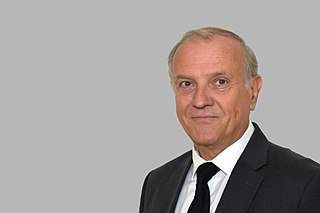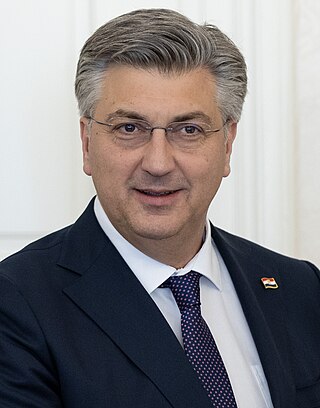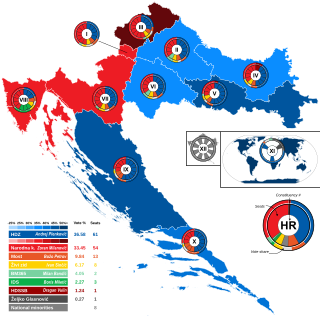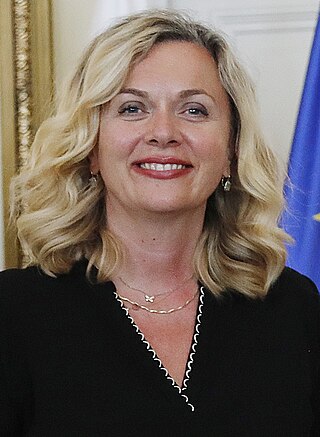
The Croatian Democratic Union is a major conservative, centre-right political party in Croatia. Since 2016, it has been the ruling political party in Croatia under the incumbent Prime Minister Andrej Plenković. It is one of the two major contemporary political parties in Croatia, along with the centre-left Social Democratic Party (SDP). It is currently the largest party in the Sabor with 55 seats. The HDZ governed Croatia from 1990 before the country gained independence from Yugoslavia until 2000 and, in coalition with junior partners, from 2003 to 2011, and since 2016.

The Social Democratic Party of Croatia is a social-democratic political party in Croatia. The SDP is anti-fascist, progressive, and strongly pro-European. The SDP was formed in 1990 as the successor of the League of Communists of Croatia, the Croatian branch of the League of Communists of Yugoslavia, which had governed Croatia within the Socialist Federal Republic of Yugoslavia since World War II.
Regular elections in Croatia are mandated by the Constitution and legislation enacted by Parliament. The presidency, Parliament, county prefects and assemblies, city and town mayors, and city and municipal councils are all elective offices. Since 1990, seven presidential elections have been held. During the same period, ten parliamentary elections were also held. In addition, there were nine nationwide local elections. Croatia has also held three elections to elect members of the European Parliament following its accession to the EU on 1 July 2013.

Dubravka Šuica is a Croatian politician of the centre-right Croatian Democratic Union (HDZ) who has been Vice-President of the European Commission and Commissioner for Democracy and Demography since 2019. She previously served as a member of the European Parliament from 2013 to 2019.

Zoran Milanović is a Croatian politician serving as the president of Croatia since 2020. Prior to assuming the presidency, he was prime minister of Croatia from 2011 to 2016, as well as president of the Social Democratic Party (SDP) from 2007 to 2016.

Gordan Jandroković is a Croatian diplomat and politician serving as Speaker of the Croatian Parliament since 2017. He previously served as Minister of Foreign Affairs and European Integration from 2008 to 2011, and as Deputy Prime Minister from 2010 to 2011 in the cabinets of prime ministers Ivo Sanader and Jadranka Kosor.

Dražen Bošnjaković is a Croatian politician who had served as the Minister of Justice in the cabinet of Andrej Plenković from 2017 to 2020.

Petri Ilari Sarvamaa is a Finnish politician who served as Member of the European Parliament (MEP) from 2012 to 2024. He is a member of the National Coalition Party, part of the European People's Party. Before becoming an MEP, he had a long career as a journalist at Finland's national broadcasting company Yle.

Andrej Plenković is a Croatian politician serving as prime minister of Croatia since October 2016. He was previously one of eleven Croatian members of the European Parliament, serving from Croatia's accession to the European Union in 2013 until his resignation as MEP when he took office as prime minister. Plenković has also been serving as the president of the Croatian Democratic Union since 2016.

Božo Petrov is a Croatian politician and psychiatrist who served as Speaker of the Croatian Parliament from 2016 to 2017. He has been the president of The Bridge party since 2012.

Parliamentary elections were held in Croatia on 5 July 2020. They were the tenth parliamentary elections since the first multi-party elections in 1990 and elected the 151 members of the Croatian Parliament. 140 Members of Parliament were elected from geographical electoral districts in Croatia, three MPs were chosen by the Croatian diaspora and eight MPs came from the ranks of citizens registered as belonging to any of the 22 constitutionally recognized national minorities.

Zdravko Marić is a Croatian economist and politician who served as the Minister of Finance from 2016 and a Deputy Prime Minister from 2019, until his resignation from both positions in 2022. He was the first non-partisan holder of the office in Croatia's post-independent history.

Parliamentary elections were held in Croatia on 11 September 2016, with all 151 seats in the Croatian Parliament up for election. The elections were preceded by a successful motion of no confidence against Prime Minister Tihomir Orešković and his cabinet on 16 June 2016, with 125 MPs voting in favour of the proposal. A subsequent attempt by the Patriotic Coalition to form a new parliamentary majority, with Minister of Finance Zdravko Marić as Prime Minister, failed and the Parliament voted to dissolve itself on 20 June 2016. The dissolution took effect on 15 July 2016, which made it possible for President Kolinda Grabar-Kitarović to officially call for elections on 11 September 2016. These were the ninth parliamentary elections since the 1990 multi-party elections.

Željana Zovko is a Bosnian and Croatian diplomat and politician. Since 2016, she has been serving as a member of the European Parliament from Croatia.
Tiemo Wölken is a German lawyer and politician who has been a Member of the European Parliament (MEP) since 14 November 2016. He is a member of the Social Democratic Party, part of the Party of European Socialists.

European Parliament elections were held in Croatia on 26 May 2019, electing members of the national Croatia constituency to the European Parliament. These were the third such elections in the country since its accession to the European Union in 2013.

Mislav Kolakušić is a Croatian lawyer and politician who has been a Member of the European Parliament for Croatia since 2 July 2019, having been elected to the position at the 2019 election as an Independent. Previously, he served as a judge at the Zagreb Commercial Court.
Vesna Bedeković is a Croatian pedagog and politician who served as the Minister of Demographics, Family, Youth and Social Policy from July 2019 to July 2020 in the cabinet of Andrej Plenković.

Sunčana Glavak is a Croatian politician of the Croatian Democratic Union (HDZ) who has been serving as a Member of the European Parliament since 2019.

Parliamentary elections were held in Croatia on 17 April 2024 to elect the members of the 11th Sabor. Prior to the elections, the government consisted of a coalition of the Croatian Democratic Union and Independent Democratic Serb Party, with parliamentary support of five national minority MPs, two MPs from the Croatian Social Liberal Party and Croatian Demochristian Party, and one independent MP, Silvano Hrelja.
















